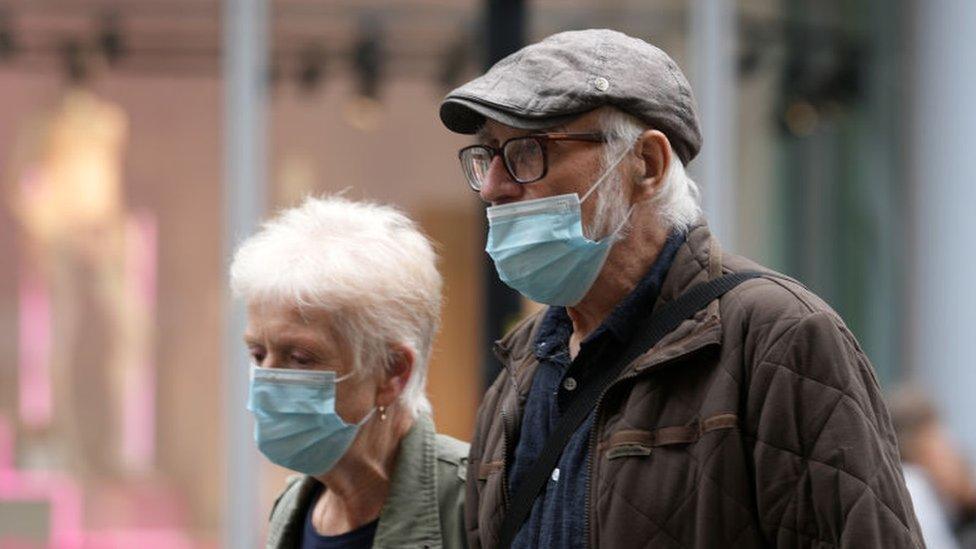Covid: Booster jabs for over-50s expected to be announced
- Published
- comments

Ministers are to outline their plans for attempting to control the pandemic through the winter.
It is expected that all over-50s will be offered a third booster jab, after advice from the JCVI.
BBC political editor Laura Kuenssberg said the booster would be a single dose of the Pfizer vaccine at least six months after a second dose.
The vaccines minister said the country was in a "very strong place" to begin a booster campaign this month.
Nadhim Zahawi told BBC Breakfast interim proposals published by the independent Joint Committee on Vaccination and Immunisation (JCVI) in June - which suggested jabs should go to the over-70s and those most at risk first, before expanding to all adults aged over 50 - had allowed the NHS to prepare.
But the government has been waiting for final recommendations from the JVCI on who should receive the extra doses before announcing more details.
It is likely the booster programme will be similar to interim proposals published by the committee.
Mr Zahawi said the government had accepted the final advice of the JCVI and the prime minister and health secretary would set out more detail later.
A Covid booster would be "co-administered" with a flu jab wherever possible, he said.
"This is probably the last piece of jigsaw to allow us to transition this virus from pandemic to endemic and I hope by next year we'll be in a position to deal with this virus with an annual inoculation programme as we do with flu," he told BBC Radio 4's Today programme.
On Monday, the government confirmed all children aged 12 to 15 in England would be offered one dose of the Pfizer jab, with invitations going out from next week.
It follows advice from the UK's chief medical officers, who say the jab will help reduce disruption to education.
A rollout is yet to be confirmed in Scotland, Wales and Northern Ireland.
The news on booster jabs comes as the government prepares to set out its plan for managing Covid through the autumn and winter.
In a statement before the announcement, Prime Minister Boris Johnson said while the pandemic "is far from over", the "phenomenal vaccine programme, new treatments and testing" mean the UK is "able to live with the virus without significant restrictions on our freedoms".
The PM, who will chair a cabinet meeting later ahead of a coronavirus press conference at 15:30 BST, said he would lay out a strategy for the months ahead "when the virus has a natural advantage, to protect the gains we have made".
Mr Zahawi told BBC Breakfast that when the pandemic first hit the only effective tool available was lockdown but "the vaccines have changed all that" and they are now the "main tool within our arsenal".
However, asked whether the country could still see lockdowns again in the future, the vaccines minister said it would be "foolhardy" to rule anything out.
He also said the option of making proof of vaccination mandatory to access venues like nightclubs "remains in reserve" but the booster campaign would hopefully put "downward pressure" on infection rates.
Mr Johnson's Covid winter plan for England is expected to focus on contingency measures that would be brought in if the NHS was at risk of becoming overwhelmed due to the virus.
The government's Scientific Advisory Group for Emergencies (Sage) had devised a series of options to limit the spread of Covid without the use of lockdowns, including bringing back mandatory face coverings and working from home if there was a winter surge in infections, according to the Times, external.
At a Downing Street briefing on Monday, Prof Chris Whitty, England's chief medical officer, said "anybody who believes that the big risk of Covid is all in the past... has not understood where we're going to head as we go into autumn and winter".
He said there would continue to be "pressure on the NHS" and "disruption to education".

Plan for worst, hope for best

There is a huge amount of uncertainty about what winter will bring. In fact, it's not even clear what the next month will bring.
It was feared September could see Covid cases rise, but there are no signs of that happening yet.
Big surges in infection levels are probably behind us, given the amount of immunity built up in the population.
But if current levels are sustained throughout winter the NHS will struggle. That will certainly be the case if other respiratory illnesses bounce back like experts fear.
A respiratory virus called RSV is already circulating at very high levels. It can cause 30,000 hospitalisations every winter among the under fives - five times the number admitted for Covid since the start of the pandemic.
Flu could also take off. Lockdowns and social distancing last winter means immunity has waned across the board. It's important to plan for the worst, while hoping for the best.

The JCVI said earlier this month a third vaccine dose should be offered to people over the age of 12 with severely weakened immune systems - which accounts for up to half a million people in the UK.
It came after research showing about 40% of people with weakened immune systems had a low antibody response, and potentially less protection, after two vaccine doses.
Over 48 million people in the UK have had their first dose of a vaccine, with more than 44 million having their second dose.

A VOYAGE TO THE EDGE OF REASON: New epic drama streaming on BBC iPlayer
THE CARDIFF FIVE: One of Britain's most notorious miscarriages of justice
